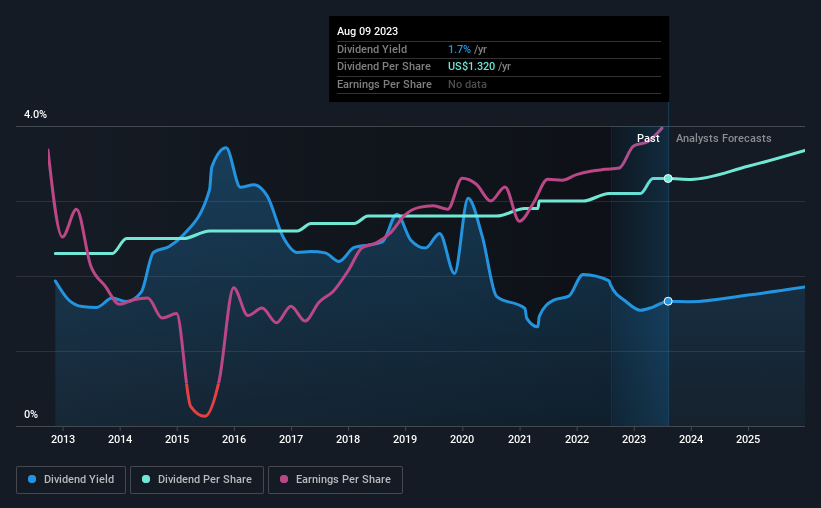The Timken Company (NYSE:TKR) Looks Interesting, And It's About To Pay A Dividend
It looks like The Timken Company (NYSE:TKR) is about to go ex-dividend in the next 4 days. The ex-dividend date is usually set to be one business day before the record date which is the cut-off date on which you must be present on the company's books as a shareholder in order to receive the dividend. The ex-dividend date is an important date to be aware of as any purchase of the stock made on or after this date might mean a late settlement that doesn't show on the record date. This means that investors who purchase Timken's shares on or after the 14th of August will not receive the dividend, which will be paid on the 28th of August.
The company's next dividend payment will be US$0.33 per share, on the back of last year when the company paid a total of US$1.32 to shareholders. Last year's total dividend payments show that Timken has a trailing yield of 1.7% on the current share price of $79.34. Dividends are an important source of income to many shareholders, but the health of the business is crucial to maintaining those dividends. As a result, readers should always check whether Timken has been able to grow its dividends, or if the dividend might be cut.
See our latest analysis for Timken
Dividends are usually paid out of company profits, so if a company pays out more than it earned then its dividend is usually at greater risk of being cut. Timken has a low and conservative payout ratio of just 21% of its income after tax. Yet cash flows are even more important than profits for assessing a dividend, so we need to see if the company generated enough cash to pay its distribution. The good news is it paid out just 22% of its free cash flow in the last year.
It's encouraging to see that the dividend is covered by both profit and cash flow. This generally suggests the dividend is sustainable, as long as earnings don't drop precipitously.
Click here to see the company's payout ratio, plus analyst estimates of its future dividends.
Have Earnings And Dividends Been Growing?
Businesses with strong growth prospects usually make the best dividend payers, because it's easier to grow dividends when earnings per share are improving. If earnings decline and the company is forced to cut its dividend, investors could watch the value of their investment go up in smoke. Fortunately for readers, Timken's earnings per share have been growing at 18% a year for the past five years. The company has managed to grow earnings at a rapid rate, while reinvesting most of the profits within the business. Fast-growing businesses that are reinvesting heavily are enticing from a dividend perspective, especially since they can often increase the payout ratio later.
The main way most investors will assess a company's dividend prospects is by checking the historical rate of dividend growth. In the last 10 years, Timken has lifted its dividend by approximately 3.7% a year on average. Earnings per share have been growing much quicker than dividends, potentially because Timken is keeping back more of its profits to grow the business.
The Bottom Line
Is Timken an attractive dividend stock, or better left on the shelf? We love that Timken is growing earnings per share while simultaneously paying out a low percentage of both its earnings and cash flow. These characteristics suggest the company is reinvesting in growing its business, while the conservative payout ratio also implies a reduced risk of the dividend being cut in the future. Timken looks solid on this analysis overall, and we'd definitely consider investigating it more closely.
So while Timken looks good from a dividend perspective, it's always worthwhile being up to date with the risks involved in this stock. Our analysis shows 1 warning sign for Timken and you should be aware of it before buying any shares.
Generally, we wouldn't recommend just buying the first dividend stock you see. Here's a curated list of interesting stocks that are strong dividend payers.
Have feedback on this article? Concerned about the content? Get in touch with us directly. Alternatively, email editorial-team (at) simplywallst.com.
This article by Simply Wall St is general in nature. We provide commentary based on historical data and analyst forecasts only using an unbiased methodology and our articles are not intended to be financial advice. It does not constitute a recommendation to buy or sell any stock, and does not take account of your objectives, or your financial situation. We aim to bring you long-term focused analysis driven by fundamental data. Note that our analysis may not factor in the latest price-sensitive company announcements or qualitative material. Simply Wall St has no position in any stocks mentioned.

